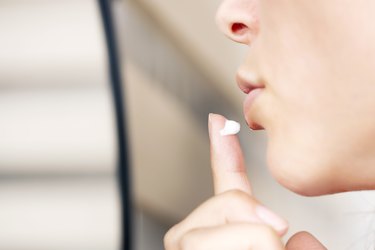
First comes the telltale burning, tingling, itching or throbbing sensation around your lip area. Over the next day or two, red, swollen blisters appear, oozing fluid. Several days later, it scabs over, forming a yellowish crust.
If you're among the 48 percent of people who get cold sores, according to the Centers for Disease Control and Prevention, you're familiar with this unpleasant cycle.
Video of the Day
Video of the Day
"Cold sores are small, fluid-filled blisters that occur on the skin as a result of infection with herpes simplex virus (HSV)," says dermatologist Janiene Luke, MD, associate professor and residency program director at the Loma Linda University Department of Dermatology. "They are usually infectious [from when you first feel the tingling] until they crust over." Translation: Avoid kissing and oral sex, and don't share drinks, towels, lip balm or razors during this contagious period.
If left untreated, the sores take about five to 15 days from onset to heal completely, per the American Academy of Dermatology (AAD). But even after the lesion has cleared up, you're not out of the woods.
"The virus typically lies dormant in the body but can be reactivated, causing additional outbreaks," Dr. Luke says. This might happen if your immune system has taken a hit — say, you're under stress, sleeping poorly or sick (that's why they're called cold sores or fever blisters).
Although you can't technically cure a cold sore because it's caused by a virus, there are steps you can take to speed up healing slightly and reduce visible symptoms. Try these remedies.
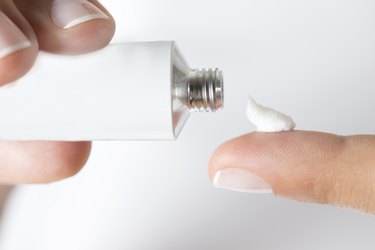
Meet the fastest way to "heal" a cold sore: "Treat it with antiviral medication as soon as the first sign or symptom is noticed," Dr. Luke says. "It usually [presents as] tingling, burning, pain or itching in the area."
Taking a doctor-prescribed oral medication typically works best, but you can try an over-the-counter cream. "Docosanol or [its name-brand cousin] Abreva may shorten healing time and minimize symptoms," Dr. Luke says.
Zovirax (aka acyclovir) is also FDA-approved for cold sores, she says, but it's only available by prescription.
Be sure to wash your hands before and after putting on the cream.
Here's the catch: Rx oral antiviral meds can lessen healing time by a day or two, according to Harvard Health Publishing, but they're not going to make a lesion disappear overnight or within 24 hours. And OTC creams are even less effective.
Try These OTC Creams
- Docosanol Cold Sore Cream, 10%: $13.99, Walgreens.com
- Abreva Cold Sore Treatment: $16.44, Amazon.com
2. Use a Pain Reliever
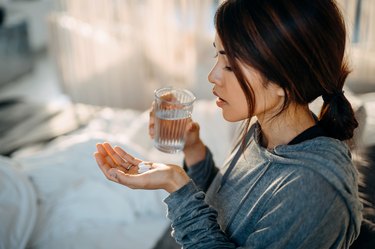
Add a bottle of acetaminophen (Tylenol), ibuprofen or a topical anesthetic cream (which contains numbing agents) to your shopping cart. It won't shrink the cold sore, but it can alleviate discomfort, Dr. Luke says.
3. Apply Ice
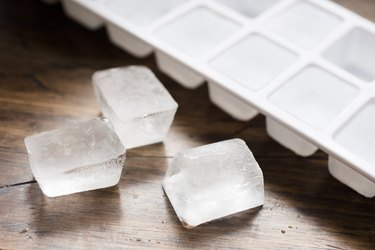
Give cold sores the deep freeze.
"Ice may reduce some of the redness and swelling," Dr. Luke says. "It may also provide mild, temporary pain relief."
Press an ice pack or a cold, wet washcloth against the blister for five to 10 minutes a few times a day. If the cold sore is inside your mouth, suck on ice chips.
4. Cold Sore Patches
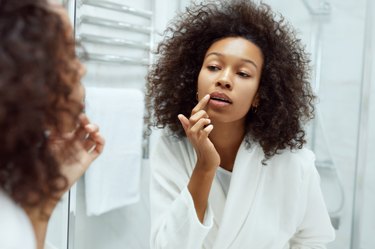
A cold sore patch is a tiny circular bandage intended to conceal a cold sore, reduce symptoms and promote healing.
"Most cold sore patches do not contain active medication. They work by providing a moist environment to facilitate and speed up the healing process," Dr. Luke says. "They can also serve as a protective barrier to prevent cross-contamination."
In other words, they reduce the risk that you'll touch the cold sore and then spread the virus to other people.
Try These Cold Sore Patches
- Mederma Cold Sore Discreet Healing Patch: $19.99 for 15; Amazon.com
- Compeed Invisible Cold Sore Patch: $13.99 for 15; Walmart.com
5. Avoid Certain Foods

Certain nibbles can exacerbate a cold sore and delay healing, according to the AAD, Brown Health Services and the Cleveland Clinic. Avoid the following:
- Acidic food: Think: tomato sauce, vinegar and citrus. They can lead to stinging and irritation.
- Spicy food: Your cold sore won't play nice with hot sauce, chili or chorizo.
- Salty food: Chips and fries might make blisters more painful.
- Big bites of food: Opening your mouth super wide — say, to chomp into a large sandwich or burger — might cause your cold sore to crack or split open. Ouch!
On the other hand, immune-boosting fare like fruits and veggies are good foods to eat when you have a cold sore.
6. Vaseline
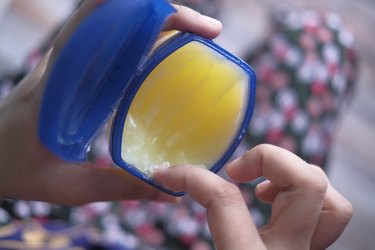
If it feels soothing, go ahead and slather on petroleum jelly.
"Vaseline will not 'treat' the cold sore, but will keep the area moist as it heals," Dr. Luke says.
According to the AAD, applying it to your cold sore can reduce dryness, crustiness and cracking.
What About Lemon Balm?
Lemon balm is an herb in the mint family whose leaves have a subtle citrusy smell and taste — it's sometimes used to add tangy flavor to food. Lemon balm is also known for its medicinal properties.
According to the University of Maryland Medical Center, since medieval times it has been used to help with everything from wound healing to stress relief to indigestion.
Can it also help with cold sores? The research is far from conclusive. "There is some evidence from a few small studies that lemon balm has some antiviral properties and can help decrease the redness and swelling associated with a cold sore," Dr. Luke says. For example, a July 2020 in vitro study in Molecules discovered that, thanks to its antiviral activity, lemon balm inhibited cold sore cells.
But how cells react in a petri dish is a far cry from what might happen in the human body. And the American Academy of Family Physicians (AAFP) says there is no medical proof that lemon balm will reduce pain or shorten healing time.
"There are other treatment options that have more scientific data and/or FDA approval and should be considered prior to using lemon balm," Dr. Luke says
If you still want to give it a shot, the University of Florida suggests swiping on a lip balm containing lemon balm extract at the first sign of a sore. Use it two to three times a day.
What About Rubbing Alcohol?
The theory behind putting rubbing alcohol on a cold sore is that it will dry it out. But Dr. Luke urges caution, pointing out that it could cause burning and irritation.
What About Hydrogen Peroxide?
You may have heard that, because it's an antiseptic, hydrogen peroxide can make cold sores vanish. Nope.
"In fact, it may cause burning and irritation," Dr. Luke says.
What About Toothpaste?
Some folks swear that toothpaste helps cold sores by drying them out and clearing them up faster. So we ran this method by Dr. Luke. Her verdict? Take a pass on the paste.
What About Baking Soda?
Another hyped-up cure is spreading a baking soda paste over cold sore legions. Don't buy it. Dr. Luke gives this strategy two thumbs down.
What About Tea Tree Oil?
Created by distilling leaves of the tea tree, native to Australia, tea tree oil has long been used in herbal medicine as an antiseptic.
Both Dr. Luke and the AAFP maintain that there is no scientific evidence that this Aussie remedy will help with a cold sore.
What About Garlic?
Not only are these flavorful cloves a chef's best friend, but they also have anti-inflammatory and antiviral properties — which may be why the Internet swears that rubbing a cut garlic glove on a cold sore can cure a cold sore. Is this treatment woo-woo or legit?
"Unfortunately, there is insufficient medical evidence to support its use to treat, heal or shorten the duration of cold sores," Dr. Luke says.
How to Prevent Cold Sores
Your best bet when it comes to cold sore treatment is to never get one in the first place. Put the brakes on blisters with these tips from Dr. Luke and Brown Health Services:
- Use lip balm with SPF: UV radiation can trigger an outbreak, so load up on sunscreen and sun hats.
- Get plenty of R&R: Sleep loss weakens your immune system, allowing the cold sore virus to take hold more easily.
- Minimize stress: Stress also takes a toll on your immune system. So carve out time to exercise, hang out with friends, meditate and reduce your screen use (especially social media and doomscrolling).
- Wear a scarf: Cold weather and wind can dry out your lips, making them more prone to a cold sore attack.
- Ask your doctor about suppressive therapy: If you're having multiple cold sore outbreaks, consider suppressive therapy to prevent or at least decrease outbreaks. This involves taking an oral antiviral medication daily, but often at a lower dose than if you had an active outbreak.
Related Reading
- Centers for Disease Control and Prevention: "Prevalence of Herpes Simplex Virus Type 1 and Type 2 in Persons Aged 14–49: United States, 2015–2016"
- American Academy of Dermatology: "Cold Sores: Tips for Managing"
- Harvard Health Publishing: "Preventing Cold Sores"
- Brown Health Services: "Cold Sores"
- Cleveland Clinic: "Cold Sores"
- University of Maryland Medical Center: "Lemon Balm"
- Molecules: "Glycerosome of Melissa officinalis L. Essential Oil for Effective Anti-HSV Type 1"
- American Academy of Family Physicians: "How to Treat a Cold Sore"
- University of Florida: "Medicinal Plant of This Week: Lemon Balm"
Is this an emergency? If you are experiencing serious medical symptoms, please see the National Library of Medicine’s list of signs you need emergency medical attention or call 911.